Sign up below to receive monthly eMHPrac newsletters and updates about the latest digital mental health news, events, and resources.

Welcome to the August 2021 edition of the eMHPrac newsletter. It has been a tough few months for many Australians, with extensive lockdowns across the country. It is now well-known that these impacts of these lockdowns significantly affect our mental health, especially the cumulative effect of repeated lockdowns, so there has never been a more important time throughout this pandemic to share and promote easily accessible digital mental health resources.
In this edition, we highlight the newly translated multilingual mental health resources from This Way Up to help people who speak a range of other languages, including Arabic, Chinese, Filipino, Hindi, Korean and more. We also highlight some of eMHPrac’s new resources outlining digital mental health resources for addictions and carers.
In this edition
- eMHPrac Courses for Psychologists and Allied Mental Health Professionals
- Multilingual Coping Tools and Worksheets from This Way Up
- Latest eMHPrac digital mental health guides and factsheets
- Latest eMHPrac Podcast – Episode 4 with Jay Court
- WellMob has published its first e-newsletter!
- See the eMHPrac team at these upcoming conferences
- Read the latest dMH research articles
- This month’s featured service: AIMhi Stay Strong
eMHPrac Course for Psychologists and Allied Mental Health Professionals
The eMHPrac Course for Psychologists and Allied Health Professionals, presented by Black Dog Institute, has just been updated!
This 5 module course provides Clinicians with the information and skills necessary to confidently use e-MH resources in their clinical practice.
The course has been developed by the Centre for Mental Health Research at the Australian National University and updated by Black Dog Institute. The content has been peer-reviewed by experts with lived experience of mental illness, e-mental health experts and senior clinicians.
These modules are free for Australian Health Professionals to access at any time.
Multilingual Coping Tools and Worksheets from This Way Up

This Way Up has translated their Coping Tools and Worksheets into common languages other than English including; Arabic, Chinese, Filipino, Greek, Hindi, Italian, Korean, Spanish, and Vietnamese.
The new translated worksheets are free to download, print, and pass on to those who will benefit. Translated worksheets are available for the following topics:
- Controlled Breathing
- Good Sleep Guide
- In Case of Emergency
- Managing Your Mood
- Positive Hunt Worksheet
- Progressive Muscle Relaxation
- Self-Care Plan
These factsheets can be downloaded individually or as a bundle.
Translated Coping Tools
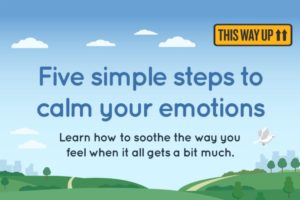
Simple Steps to Calm Your Emotions
5 psychological strategies to help you feel a little more at ease when experiencing unpleasant emotions like fear, sadness, anger, and anxiety.
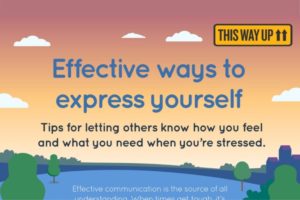
Effective ways to express yourself
5 psychological strategies to help you know what to say to express yourself calmly and effectively so you can get the help you need.
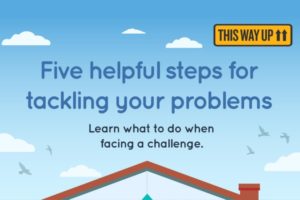
Helpful Steps to Tackle Your Problems
Practical steps to help find a solution when going through a tough time, feeling overwhelmed, stressed, anxious, or frustrated about things that take you by surprise.
Check out eMHPrac’s wide range of digital mental health guides and brochures!
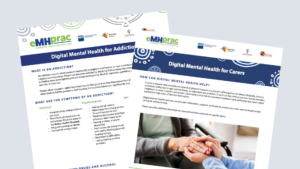
The eMHPrac team has a growing library of guides, brochures, factsheets, and other resources to help health practitioners select suitable digital mental health resources for clients (or to hand out to clients for self-help).
This month we have added two new factsheets to our Resource Library; Digital Mental Health for Addictions and Digital Mental Health for Carers. These factsheets provide brief information about how digital mental health resources can help and suggests a range of evidence-based, free, and low-cost digital mental health resources. These resources are extremely useful for clinicians to use as a reference source or can be shared directly with clients.
View or download the Digital Mental Health for Addictions factsheet here: https://bit.ly/37MbQXO
View or download the Digital Mental Health for Carers factsheet here: https://bit.ly/3sl9o46
Did you catch the latest episode of the eMHPrac Podcast?
Ep.4 – Spotlight on This Way Up
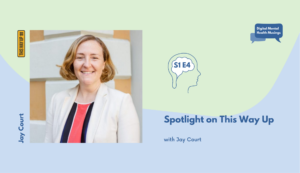
In episode 4, Dr. Ruth Crowther speaks to Jay Court from This Way Up about her journey to working in digital mental health, her experiences in mental health nursing, and take a deeper look at This Way Up.
Jay Court is the Digital Mental Health Engagement Lead for This Way Up at the Clinical Research Unit for Anxiety and Depression (CRUfAD), St. Vincent’s Hospital. Jay has dual backgrounds in mental health nursing and communications. Her interests include health nursing equity, science communication, innovative behavioural science, and interdisciplinary approaches to stakeholder engagement.
In this episode, Ruth and Jay discuss her journey from mental health nursing to becoming Digital Mental Health Engagement Lead to This Way Up, the services offered by This Way Up clinic, as well as her insights into how digital mental health services can benefit both health care workers and users. Jay also addresses some common concerns from clinicians around the role of the therapeutic relationship in iCBT and how integrating digital services into existing models of care.
You can also access Digital Mental Health Musings on Soundcloud, Apple Podcasts, Spotify, Google Podcasts, Amazon Music, and Deezer.
WellMob has published its first e-newsletter!
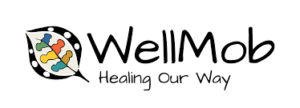
The WellMob website is an online portal that houses more than 200 Indigenous-specific social and emotional wellbeing resources that are made for and by Aboriginal and Torres Strait Islander people.
The WellMob newsletter aims to help Aboriginal and Torres Strait Islander people say mentally strong and feel deadly. Every few months WellMob subscribers will receive a newsletter highlighting some useful online resources and some tips for the health and wellbeing workforce on how to use their resources with Indigenous clients.
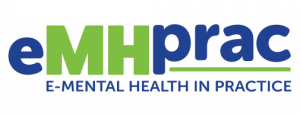
Cath us at these upcoming conferences

Workplace Mental Health Symposium
13-15 September 2021, JW Marriot Gold Coast Resort & Spa
‘Improve & Promote Workplace Mental Health and Wellbeing’
Changing work environments, rising uncertainty, and increased social isolation are just some of the factors that contribute to mental ill-health. With 30% of Australians already reporting moderate to high levels of stress – and numbers expected to rise – workplaces have a responsibility to help flatten the curve.
The symposium will provide the latest tools and knowledge to improve mental health and wellbeing in your organisation.
To register for the conference or view the program, click the link below.
Care Expo
17-18 September 2021, Brisbane Convention & Exhibition Centre
‘Disability support | Aged care | Mental wellness’
The 2021 Care Expo Brisbane brings together a diverse range of community services, businesses and organisation from the support, health and care industries. Discover and connect with providers from aged care, disability and in-home support through to education, mobility, mental health, social, recreational services and more. The 2o21 Care Expo Brisbane will also feature a range of inspirational and educational speakers.
Registration is FREE. To register for the expo or learn more, click the link below.
Indigenous Wellbeing Conference
7-8 October 2021, Cairns
At the 2021 Indigenous Wellbeing Conference, you will discover the latest Indigenous-led, grassroots programs and projects taking place around the nation and across the seas. With a program full of practical solutions, you will leave better equipped to effectively acknowledge and encompass the physical, spiritual, and cultural needs of Indigenous populations.
Catch a presentation by the eMHPrac WellMob team
or speak to them at their virtual trade booth.
To register for the conference or view the program, click the link below.
International Mental Health Conference
18-20 October 2021, Gold Coast
The International Mental Health Conference is designed for professionals, workers, and volunteers to learn best practice, grow meaningful connections and implement real solutions to mental health care.
eMHPrac Director Heidi Sturk is among the International Mental Health Program Committee this year. You can also visit the eMHPrac team at our booth in the Exhibition hall.
To register for the conference or view the program, click the link below.
On our reading radar…
The Digital Therapeutic Alliance: Prospects and Considerations
Lederman R, D’Alfonso S. The Digital Therapeutic Alliance: Prospects and Considerations. JMIR Ment Health 2021;8(7):e31385. URL: https://mental.jmir.org/2021/7/e31385. DOI: 10.2196/31385
“The growing prevalence of digital approaches to mental health care raises a range of questions and considerations. A notion that has recently emerged is that of the digital therapeutic alliance, prompting consideration of whether and how the concept of therapeutic alliance, which has proven to be a central ingredient of successful traditional psychotherapy, could translate to mental health care via digital technologies. This special issue editorial article outlines the topic of digital therapeutic alliance and introduces the five articles that comprise the special issue.“
Mental Health Service User and Worker Experiences of Psychosocial Support Via Telehealth Through the COVID-19 Pandemic: Qualitative Study
Venville A, O’Connor S, Roeschlein H, Ennals P, McLoughlan G, Thomas N. Mental Health Service User and Worker Experiences of Psychosocial Support Via Telehealth Through the COVID-19 Pandemic: Qualitative Study. JMIR Ment Health 2021;8(8):e29671. URL: https://mental.jmir.org/2021/8/e29671. DOI: 10.2196/29671
“During the COVID-19 pandemic, we saw telehealth rapidly become the primary way to receive mental health care. International research has validated many of the benefits and challenges of telehealth known beforehand for specific population groups. However, if telehealth is to assume prominence in future mental health service delivery, greater understanding of its capacity to be used to provide psychosocial support to people with complex and enduring mental health conditions is needed.
…We focused on an Australian community-managed provider of psychosocial intervention and support. We aimed to understand service user and worker experiences of psychosocial support via telehealth throughout the COVID-19 pandemic.
…This study was jointly developed and conducted by people with lived experience of mental ill health or distress, mental health service providers, and university-based researchers. Semistructured interviews were conducted between August and November 2020 and explored participant experiences of receiving or providing psychosocial support via telehealth, including telephone, text, and videoconferencing. Qualitative data were analyzed thematically; quantitative data were collated and analyzed using descriptive statistics.
…Service users (n=20) and workers (n=8) completed individual interviews via telephone or videoconferencing platform. Service users received psychosocial support services by telephone (12/20, 60%), by videoconferencing (6/20, 30%), and by both telephone and videoconferencing (2/20, 10%). Of note, 55% (11/20) of service user participants stated a future preference for in-person psychosocial support services, 30% (6/20) preferred to receive a mixture of in-person and telehealth, and 15% (3/20) elected telehealth only. Two meta-themes emerged as integral to worker and service user experience of telehealth during the pandemic: (1) creating safety and comfort and (2) a whole new way of working. The first meta-theme comprises subthemes relating to a sense of safety and comfort while using telehealth; including trusting in the relationship and having and exercising choice and control. The second meta-theme contains subthemes reflecting key challenges and opportunities associated with the shift from in-person psychosocial support to telehealth.
Overall, our findings highlighted that most service users experienced telehealth positively, but this was dependent on them continuing to get the support they needed in a way that was safe and comfortable. While access difficulties of a subgroup of service users should not be ignored, most service users and workers were able to adapt to telehealth by focusing on maintaining the relationship and using choice and flexibility to maintain service delivery. Although most research participants expressed a preference for a return to in-person psychosocial support or hybrid in-person and telehealth models, there was a general recognition that intentional use of telehealth could contribute to flexible and responsive service delivery. Challenges to telehealth provision of psychosocial support identified in this study are yet to be fully understood.”
This edition’s featured service…

AIMhi Stay Strong
AIMhi Stay Strong is a Therapist-guided app for Indigenous clients with wellbeing concerns, chronic disease, or substance misuse problems.
About AIMhi Stay Strong
The AIMhi Stay Strong app is a motivational care planning tool that assists health professionals to promote the wellbeing of Aboriginal clients by considering their social supports, strengths, worries, and the goals or changes they would like to make. It is designed for use by Aboriginal Health Workers, nurses, GPs, allied health professionals and others to facilitate delivery of a structured brief intervention and can be used in clinical and community settings. The app is based on the tools developed by Aboriginal people for Aboriginal people as part of the Aboriginal and Islander Mental health Initiative (AIMhi).
Who is AIMhi Stay Strong for?
The app is designed to focus on wellbeing and is for use with Indigenous clients by Aboriginal Health Workers, nurses, GPs, allied health professionals, community workers, and others within clinical and community settings.
Is there a cost to use AIMhi Stay Strong?
No – AIMhi Stay Strong is free to download on smartphone and tablet devices.
How to access AIMhi Stay Strong
AIMhi Stay Strong can be downloaded from the iTunes App Store (IOS) or on Google Play (Android).







